汉语拼音之父:周有光
《知者乐,仁者寿》阅读练习及答案

知者乐,仁者寿汉语拼音之父周有光先生已经109岁了。
数字在年龄上的叠加并未使这位文化老人不堪重负,他反而因宽仁的心态而愈显睿智,筋骨亦保持着令人惊讶的健康。
“97岁去体检,医生以为我写错了年龄,给我改成了79岁。
”难怪医生自作主张,周有光老人除了耳背眼花,其敏捷的思维和健康的体态与真实年龄形成的反差的确令人惊叹。
自从过了80岁生日,周有光便从头开始计算年龄了。
92岁时他收到小朋友寄来的贺卡,上面写着:祝12岁的老爷爷新春快乐!周有光的学生、教育部语言文字应用研究所研究员冯志伟回忆说,1981年去探望周先生,一进门,地板就咯吱咯吱响起来,我们说,没想到像周先生这样世界知名的大语言学家的住房条件竟这样差,他笑着说:“如果地板不响,我怎么知道你们来了呢?”上世纪五十年代周有光调到北京工作后就住在位于沙滩的文改会宿舍,那是民国时期给北京大学德国教授住的小洋房。
“当时人家听说我住在德国教授的洋房里,以为一定是很好的,想不到这个房子破烂得不得了。
”“房间阴暗,更显得窗子明亮。
书桌不平,更怪我伏案太勤。
门槛破烂,偏多不速之客。
地板跳舞,欢迎老友来临。
卧室就是厨房,饮食方便。
书橱兼做菜橱,菜有书香……使尽吃奶力气,挤上电车,借此锻炼筋骨。
为打公用电话,出门半里,顺便散步观光……”周先生这篇戏仿的《新陋室铭》乐观豁达地描述了生活环境的窘迫,其健康智慧的生活态度跃然纸上。
“卒然临之而不惊,无故加之而不怒。
”遇到难题,周有光就搬出古人的话来应对。
他说:“遇到困难,你要找一个缝缝,从这个缝缝里面可以走出去。
‘文革’时,下放‘五七干校’,只许带一本书,可我带了不同文字的《毛主席语录》一共20本,开始做比较文字研究。
”周有光八九十岁高龄仍有许多著作不断问世,许多人感到奇怪,他解释说:“其实我一早就开始研究了,材料早弄好了,就差整理了。
”1969年,周有光被下放到宁夏,当时同去的许多人以为再也回不来了,非常忧愁。
“我觉得很有趣味,假如不是‘文革’,宁夏这个地方我可能不会来。
“汉语拼音之父”周有光的养生经
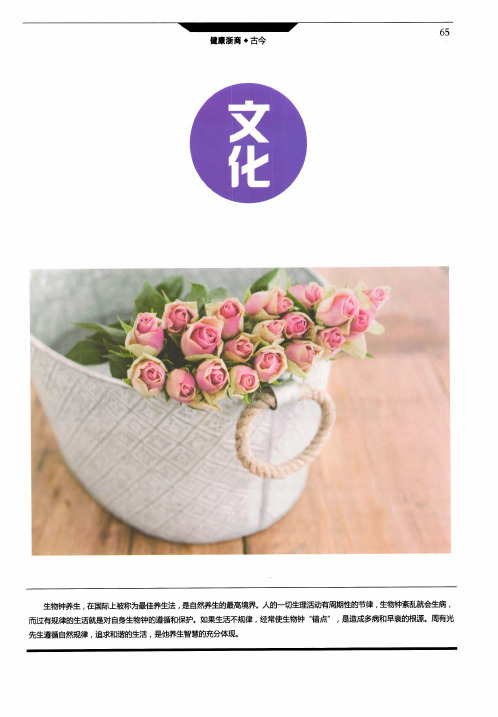
健康浙商◆古今
,
长
参
{I,
一…f
生物钟养生,在国际上被称为最佳养生法,是自然养生的最高境界。人的一切生理活动有周期性的节律.生物钟莉L就会生病,
而过有规律的生活就是对自身生物钟的遵循和保护。如果生活不规律,经常使生物钟”错点”,是造成多病和早衰的根源。周有光 先生遵循自然规律,追求和谐的生活,是他养生智慧的充分体现。
健康浙商◆古今
卫
汉语拼音之父”周有光的养生经
文/陈卫卫 老感到很奇怪:“你是医生,怎么还问 我啊?”然后他想了想,总结出来一点: “我从来不乱吃东西。”又说这是因为 以前有位上海医生告诉他,大多数人都 是乱吃食物才导致了疾病丛生,从此他 在日常饮食上一直坚持多吃素、少吃荤、 不吃补品的原则。 周有光吃得很清淡,鸡蛋、青菜、 牛奶和豆腐是他的主要食物。有时胃口 特别好,想吃烤鸭时,周老就开个荤多 吃点,偶尔还吃些大闸蟹或者葱油海参 等。而他最爱吃的,则是苏州一家老字 号的玫瑰腐乳,这种玫瑰腐乳颜色深紫, 像是熟透了的玫瑰花瓣,口感有淡淡的 甜。经常有人开玩笑地说,周老这么长 寿,也许是长期食用玫瑰腐乳的关系吧。 此外,周老喜欢喝红茶,他说:“红茶 性味甘温,可补气养阳、生热暖体,还 能够去油腻、开胃口。” 对于补品,周有光一向是拒绝的. 而且把别人送的补品全都转送给了亲友。 不乱吃,也是周有光坚持的原则之一, 他看到许多人每每在宴席上一见山珍海 味就大吃特吃,这样既造成营养过剩,
T
被誉为”汉语拼音之父”的 著名语言学家周有光先生,高寿 达112岁,堪称最长寿的文化老 人。周老独到的养生经,在于饮 食清淡、不生气、生活有规律、 多做小运动和家庭温馨。
,,
的身体很庞大,它却健康得很,不大生病, 虽然它没有蹦啊跳的,但它的鼻子却经 常地运动着,这正是持久的小运动带来 的大健康。而且这种锻炼不需要器械、 场地,随时都可以进行。” 有句话说,家庭温馨是长寿的润滑 剂。周有光和张允和结婚七十多年,两 人世界相当和谐,从来没有红过脸。正 如著名作家叶圣陶先生说的那样:“苏 州九如巷张家的四个才女,谁娶了她们
炽热百年_一生有光_汉语拼音之父周有光阅读笔耕养生法
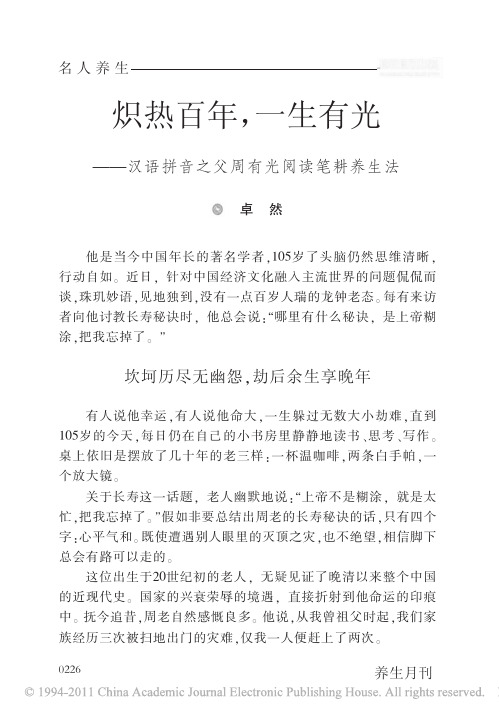
他是当今中国年长的著名学者,105岁了头脑仍然思维清晰,行动自如。
近日,针对中国经济文化融入主流世界的问题侃侃而谈,珠玑妙语,见地独到,没有一点百岁人瑞的龙钟老态。
每有来访者向他讨教长寿秘诀时,他总会说:“哪里有什么秘诀,是上帝糊涂,把我忘掉了。
”坎坷历尽无幽怨,劫后余生享晚年有人说他幸运,有人说他命大,一生躲过无数大小劫难,直到105岁的今天,每日仍在自己的小书房里静静地读书、思考、写作。
桌上依旧是摆放了几十年的老三样:一杯温咖啡,两条白手帕,一个放大镜。
关于长寿这一话题,老人幽默地说:“上帝不是糊涂,就是太忙,把我忘掉了。
”假如非要总结出周老的长寿秘诀的话,只有四个字:心平气和。
既使遭遇别人眼里的灭顶之灾,也不绝望,相信脚下总会有路可以走的。
这位出生于20世纪初的老人,无疑见证了晚清以来整个中国的近现代史。
国家的兴衰荣辱的境遇,直接折射到他命运的印痕中。
抚今追昔,周老自然感慨良多。
他说,从我曾祖父时起,我们家族经历三次被扫地出门的灾难,仅我一人便赶上了两次。
炽热百年,一生有光———汉语拼音之父周有光阅读笔耕养生法卓然一百多年前,每一个新出生的中国人的身后都追逐着一堆不同名目的灾难,那是名副其实的战乱年代。
当时周家在常州属于殷实富足的大户,不想太平天国燃起的战火,扰乱了他们平静的生活。
在太平军打进常州城,恐惧羞辱的曾祖父投河自尽,偌大的周家第一次被扫地出门。
77年后,抗日战争爆发,日本兵很快打进周家迁居的苏州,他们第二次被扫地出门。
“十年动乱”中,周老下放宁夏两年四个月,回来后发现造反派住在自己家,往日温馨静谧的小天地,被弄得面目全非,一片狼藉。
这是周家第三次,周有光第二次被扫地出门。
对于不堪回首的苦难,周老非但没有铭刻于怀的怨恨,反倒认为它有好的一面,不是么,没有财产,就没有包袱,无所牵挂,让人活得自在轻松。
读书学习兼笔耕,心平气和神淡定纵观历史,一生读大书,进行大研究并取得大成就的大学者们,都有一个共同的特点,那就是,一息尚存,求索不止。
《有光一生,一生有光——记“汉语拼音之父”周有光先生》阅读练习及答案
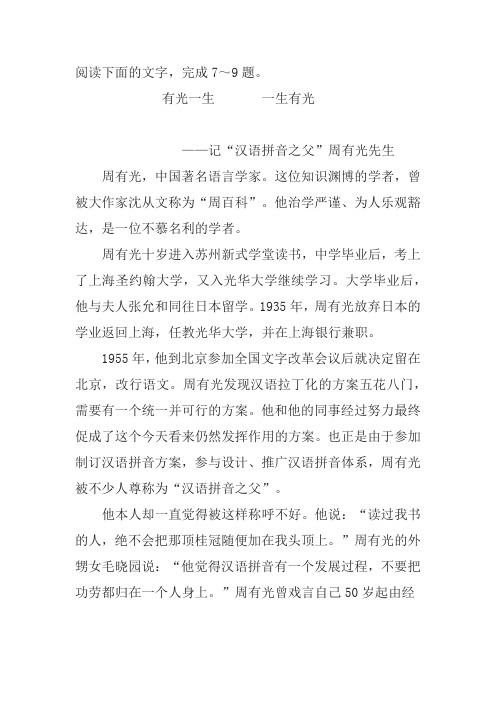
阅读下面的文字,完成7~9题。
有光一生一生有光——记“汉语拼音之父”周有光先生周有光,中国著名语言学家。
这位知识渊博的学者,曾被大作家沈从文称为“周百科”。
他治学严谨、为人乐观豁达,是一位不慕名利的学者。
周有光十岁进入苏州新式学堂读书,中学毕业后,考上了上海圣约翰大学,又入光华大学继续学习。
大学毕业后,他与夫人张允和同往日本留学。
1935年,周有光放弃日本的学业返回上海,任教光华大学,并在上海银行兼职。
1955年,他到北京参加全国文字改革会议后就决定留在北京,改行语文。
周有光发现汉语拉丁化的方案五花八门,需要有一个统一并可行的方案。
他和他的同事经过努力最终促成了这个今天看来仍然发挥作用的方案。
也正是由于参加制订汉语拼音方案,参与设计、推广汉语拼音体系,周有光被不少人尊称为“汉语拼音之父”。
他本人却一直觉得被这样称呼不好。
他说:“读过我书的人,绝不会把那顶桂冠随便加在我头顶上。
”周有光的外甥女毛晓园说:“他觉得汉语拼音有一个发展过程,不要把功劳都归在一个人身上。
”周有光曾戏言自己50岁起由经济学教授改行从事语言文字学研究,前者是半途而废,后者是半路出家,两个“半”字合在一起,就是个圆圈,一个“零”。
进入全球化时代,周有光努力推进语文现代化进程,并指出教育现代化是国家现代化的基础,语文现代化是教育现代化的前提。
中国社会科学院研究生院教授张森根说:“除了对汉语拼音的贡献,周老在创建现代汉字学、研究比较文字学以及研究中文信息处理和无编码输入法方面的学术成就都具有深远的影响。
”1991年,周有光将目光从研究拼音、文字等转移到对文化学、时代变化等问题的探索上,阅读、思考与研究的范围越来越大,写作的领域也越来越广。
据张森根介绍,周有光迄今为止出版的40多本著作中,约有一大半是在退休之后完成的。
“生活中,周有光老先生拥有积极乐观的态度;在学术上则总是对世界充满好奇心。
他曾对我说过,自己是对这个世界认真思考了的。
“汉语拼音之父”周有光

命 大运 气好 , 留在上 海搞 经济
的很 多 同事都成 了右派 , 有的
因 为 受 不 了政 治 迫 害 而 自杀 。
半路 出家 的重磅 语言 学家
14 年 , 有 光 在 建 国前 99 周 夕 回 国 , 后 在 上 海 复 旦 大 学 先
我 却 因 为 已 改行 而 移 居 北 京 ,
事 实上 , 音方案在 重新 拼
设 计 之 前 已经 有 过 两代 人 的
努力。“ 中华民国成立第二年 ,
适应现代化需要 的文字语言 , 是不可想象的。 因此, 文 当时 的政 府 就 开始 制 订 注 音 字 母 方 案 , 是 中 国语 文 这
字改 革 问题 很 早 就 被 置 于 国家 工作 日程 的 重 要 位 置 , 往 前 走 的 很 重 要 的 一 步 。 这 些 工 作 是 黎 锦 熙 先 生 搞
他是 比赵元任 更早 的一批。 了赵元任 , 第二代 到 是 并从全 国范围 内网罗 了许 多专 制 订 国语 罗 马 字 , 不 用 中 国汉 字 方 式 的 符 他 就
而 比 15 9 5年 i 0月 , 了进 一 步 规 范 简化 汉 字 , 高 号 , 用 国 际 通 用 的 字 母 。赵 元 任 和 我 是 老 乡 , 我 为 提
是 外 行 。 胡愈 之 说 :这 是 一 项新 的工 作 , 家都 是 外 国语 罗马 字制 订 汉 语 拼 音 方 案 。 ” ” “ 大
行 。” 不久, 周有光接到通知从上海调往北京。
当时拼 音 方案 委 员会 一 共 有 1 , 由几 个 大 学 5人
消息 传 出 ,朋友 们 纷 纷 相 劝 :经 济 学 多重要 啊 , 的语 言学家组成 , “ 不过 主要是 开会参加讨论。 文改会 “
学会“拐弯”的智慧 阅读答案

学会“拐弯”的智慧林来生①我国杰出的语言文字学家、“汉语拼音之父”周有光,今年105岁了,除了耳朵需要戴助听器外,思维敏捷,笔耕不止,每月都有文章发表在国内外的报刊上。
央视采访他的长寿秘诀时,周老说,凡事要想得开,要往前看。
主持人开玩笑地说,要是我还是想不开呢。
周老跟着一句说:“拐个弯,不就想开了嘛!”周老说:“拐个弯,坏事就是好事。
”他还提醒人们,“自杀的人,就是他走到要拐弯的地方,他不能拐弯,就只好死了。
”周老的“拐弯说”,是他百岁养生经验的概括和百年人生的智慧,也是对人们的忠告。
②拐弯是主动适应。
历史像一辆在弯弯曲曲路上行进的车子,每个人都是坐在车上的乘客。
车子拐弯了,而人不随着车子拐弯,就有掉下去的危险。
斯大林对此说得更形象,每当历史的车子在转弯时,总会发现有人从车子上掉下去。
原因就是这些人没有适应车子的转弯而主动转弯。
爱因斯坦曾说:“人的最高本领是适应客观条件的能力。
”“适”,就是适应、顺应,用通俗的话说,就是“会拐弯”。
由此可见,拐弯在人生的字典里是个关键词,由于每个人对这个词理解、掌握和运用的水平不同,就造成了千差万别的人生,演绎出五彩缤纷的世界。
所以,人只有主动顺应潮流,适应客观条件“拐弯”,才能生存、发展和前进。
③拐弯是清醒舍弃。
人生在世,工作中的拐弯是经常遇到的,有了这样的认识,这个弯才能转得清醒,才能在舍弃中更新和发展自我,去开拓新的领域、创造新的天地。
周有光早年专攻经济学,曾经留学日本并在美国工作,解放后回上海任经济学教授,连美国国会图书馆都藏有他的著作。
1955年,中央邀请精通中、英、法、日四国语言的周有光参与设计“汉语拼音方案”。
从金融经济转到语言文字,对年已49的周有光来说,这弯拐得很大,但他服从需要,放下前半辈子熟悉的经济学,全身心地投入到陌生的语言文字研究工作中去,并作出了重大贡献,被誉为“汉语拼音之父”。
④拐弯是理智选择。
有人说得好,人生处世行路难,行不通时拐个弯。
102岁的拼音之父周有光经典语录荟萃

102岁的拼音之父周有光经典语录荟萃102岁的拼音之父周有光经典语录荟萃我85岁离开办公室。
我这个人糊涂得不得了,我不知道哪一年退休。
我们单位人事处送给我一个离休证,我一看,前几年我就应当离开了。
他们说,我们不好意思送给你,送给你不就等于要把你赶走嘛。
离开以后,我就不做专门问题的研究了。
到家里后,有什么看什么。
香港的、美国的朋友,来的时候就买书给我。
我能够看到很多很新的图书,看历史问题的书,文化问题的书。
他们拿来什么我就看什么。
现在都是手机、电脑。
手机要保姆打,电脑屏幕我看不清楚。
保姆代我到电脑上查。
《百岁忆往》张允和的去世,对我是晴天霹雳。
我们结婚70年,从没想过会有一天二人之中少了一人。
突如其来的打击,使我一时透不过气来。
有位哲学家说过:“人如果都不死,人类就不会进化。
”残酷的进化论!《百岁忆往》理想推动了社会发展:经济从农业化到工业化到信息化,政治从神权统治到君权统治到民权统治,文化从神学思维到玄学思维到科学思维。
各国发展有先有后,差距很大,但是你进我追,都是向前,没有国家能够长期违背社会演进的历史轨道。
《朝闻道集》主义是理想,资本主义是现实,好比大同是理想,小康是现实。
《朝闻道集》国富民穷,此路不通;藏富于民,康庄大道。
《朝闻道集》历史学者说:大同实际是美化了的原始社会,生活极其简单,身外别无一物,无从私有,只能公有。
私有需要先有财产。
生产发展,开始分工,财产有了剩余,于是公有变为私有。
经济规律,不是私有发展成为公有,而是公有发展成为私有。
《朝闻道集》我课余常到阅报室看报。
一位年轻的英国老师问我和另两位同学:“你们怎么看报的?”他说:“看报有门道。
第一,看完报,要问自己,今天的'哪一条新闻最重要?第二,再问自己,为什么这一条新闻最重要?第三,还要问自己,这条新闻的背景是什么?如果不知道,就去图书馆查书,首先查《不列颠百科全书》。
”我按照老师的吩咐去做,看报兴趣马上就提高了,觉得知识有所长进,同时锻炼了独立思考。
高考语文作文素材快递112岁的“汉语拼音之父”周有光逝世
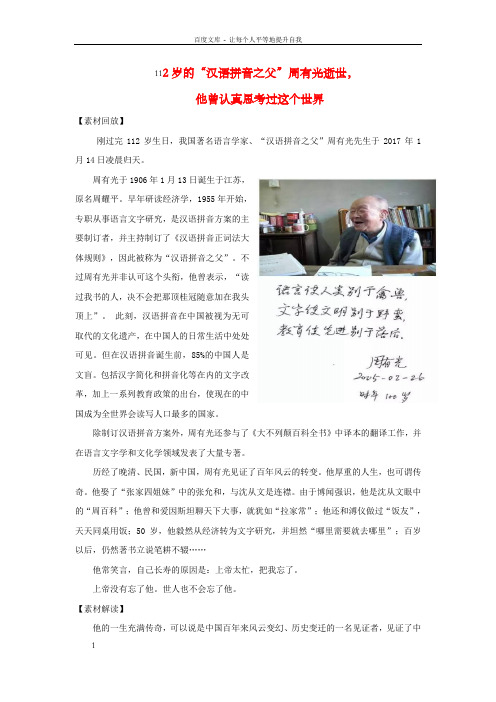
112岁的“汉语拼音之父”周有光逝世,他曾认真思考过这个世界【素材回放】刚过完112岁生日,我国著名语言学家、“汉语拼音之父”周有光先生于2017年1月14日凌晨归天。
周有光于1906年1月13日诞生于江苏,原名周耀平。
早年研读经济学,1955年开始,专职从事语言文字研究,是汉语拼音方案的主要制订者,并主持制订了《汉语拼音正词法大体规则》,因此被称为“汉语拼音之父”。
不过周有光并非认可这个头衔,他曾表示,“读过我书的人,决不会把那顶桂冠随意加在我头顶上”。
此刻,汉语拼音在中国被视为无可取代的文化遗产,在中国人的日常生活中处处可见。
但在汉语拼音诞生前,85%的中国人是文盲。
包括汉字简化和拼音化等在内的文字改革,加上一系列教育政策的出台,使现在的中国成为全世界会读写人口最多的国家。
除制订汉语拼音方案外,周有光还参与了《大不列颠百科全书》中译本的翻译工作,并在语言文字学和文化学领域发表了大量专著。
历经了晚清、民国,新中国,周有光见证了百年风云的转变。
他厚重的人生,也可谓传奇。
他娶了“张家四姐妹”中的张允和,与沈从文是连襟。
由于博闻强识,他是沈从文眼中的“周百科”;他曾和爱因斯坦聊天下大事,就犹如“拉家常”;他还和溥仪做过“饭友”,天天同桌用饭;50岁,他毅然从经济转为文字研究,并坦然“哪里需要就去哪里”;百岁以后,仍然著书立说笔耕不辍……他常笑言,自己长寿的原因是:上帝太忙,把我忘了。
上帝没有忘了他。
世人也不会忘了他。
【素材解读】他的一生充满传奇,可以说是中国百年来风云变幻、历史变迁的一名见证者,见证了中国百年来从疲弱到强盛的整个进程。
他的归天,是一个遗憾,咱们又少了一名睿智而又功勋卓著的先辈学者。
高寿本已经宝贵,能够在百岁高龄,仍旧维持着灵敏的观察力,并发出极富智慧的观点,超级值得尊重。
确实,很多人都做出过贡献,但周有光的贡献也绝不可轻忽。
尤其是他在推动中国与世界融合方面,功不可没。
这位诞生于清末的百岁老人,历经世纪沧桑,近些年反复提倡要有世界观,扩大世界观,强调不能以中国的目光看世界,而要“以世界的目光看中国”。
周有光, 周有光, 汉语拼音之父汉语拼音之父汉语拼音之父汉语
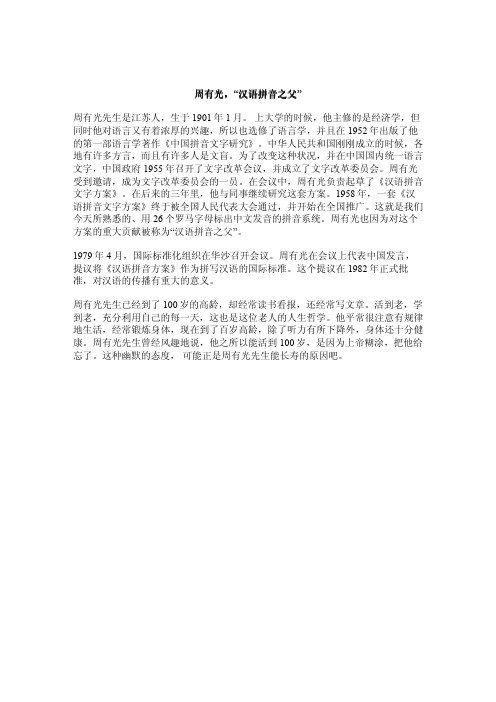
周有光周有光,,“汉语拼音之父”
周有光先生是江苏人,生于1901年1月。
上大学的时候,他主修的是经济学,但同时他对语言又有着浓厚的兴趣,所以也选修了语言学,并且在1952年出版了他的第一部语言学著作《中国拼音文字研究》。
中华人民共和国刚刚成立的时候,各地有许多方言,而且有许多人是文盲。
为了改变这种状况,并在中国国内统一语言文字,中国政府1955年召开了文字改革会议,并成立了文字改革委员会。
周有光受到邀请,成为文字改革委员会的一员。
在会议中,周有光负责起草了《汉语拼音文字方案》。
在后来的三年里,他与同事继续研究这套方案。
1958年,一套《汉语拼音文字方案》终于被全国人民代表大会通过,并开始在全国推广。
这就是我们今天所熟悉的、用26个罗马字母标出中文发音的拼音系统。
周有光也因为对这个方案的重大贡献被称为“汉语拼音之父”。
1979年4月,国际标准化组织在华沙召开会议。
周有光在会议上代表中国发言,提议将《汉语拼音方案》作为拼写汉语的国际标准。
这个提议在1982年正式批准,对汉语的传播有重大的意义。
周有光先生已经到了100岁的高龄,却经常读书看报,还经常写文章。
活到老,学到老,充分利用自己的每一天,这也是这位老人的人生哲学。
他平常很注意有规律地生活,经常锻炼身体,现在到了百岁高龄,除了听力有所下降外,身体还十分健康。
周有光先生曾经风趣地说,他之所以能活到100岁,是因为上帝糊涂,把他给忘了。
这种幽默的态度, 可能正是周有光先生能长寿的原因吧。
拐弯阅读答案
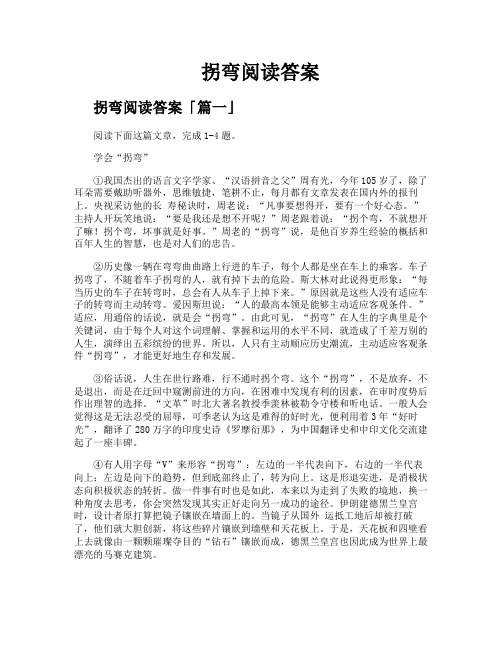
拐弯阅读答案拐弯阅读答案「篇一」阅读下面这篇文章,完成1-4题。
学会“拐弯”①我国杰出的语言文字学家、“汉语拼音之父”周有光,今年105岁了,除了耳朵需要戴助听器外,思维敏捷,笔耕不止,每月都有文章发表在国内外的报刊上。
央视采访他的长寿秘诀时,周老说:“凡事要想得开,要有一个好心态。
”主持人开玩笑地说:“要是我还是想不开呢?”周老跟着说:“拐个弯,不就想开了嘛!拐个弯,坏事就是好事。
”周老的“拐弯”说,是他百岁养生经验的概括和百年人生的智慧,也是对人们的忠告。
②历史像一辆在弯弯曲曲路上行进的车子,每个人都是坐在车上的乘客。
车子拐弯了,不随着车子拐弯的人,就有掉下去的危险。
斯大林对此说得更形象:“每当历史的车子在转弯时,总会有人从车子上掉下来。
”原因就是这些人没有适应车子的转弯而主动转弯。
爱因斯坦说:“人的最高本领是能够主动适应客观条件。
”适应,用通俗的话说,就是会“拐弯”。
由此可见,“拐弯”在人生的字典里是个关键词,由于每个人对这个词理解、掌握和运用的水平不同,就造成了千差万别的人生,演绎出五彩缤纷的世界。
所以,人只有主动顺应历史潮流,主动适应客观条件“拐弯”,才能更好地生存和发展。
③俗话说,人生在世行路难,行不通时拐个弯。
这个“拐弯”,不是放弃,不是退出,而是在迂回中窥测前进的方向,在困难中发现有利的因素,在审时度势后作出理智的选择。
“文革”时北大著名教授季羡林被勒令守楼和听电话。
一般人会觉得这是无法忍受的屈辱,可季老认为这是难得的好时光,便利用着3年“好时光”,翻译了280万字的印度史诗《罗摩衍那》,为中国翻译史和中印文化交流建起了一座丰碑。
④有人用字母“V”来形容“拐弯”:左边的一半代表向下,右边的一半代表向上;左边是向下的趋势,但到底部终止了,转为向上。
这是形退实进,是消极状态向积极状态的转折。
做一件事有时也是如此,本来以为走到了失败的境地,换一种角度去思考,你会突然发现其实正好走向另一成功的途径。
“汉语拼音之父”周有光
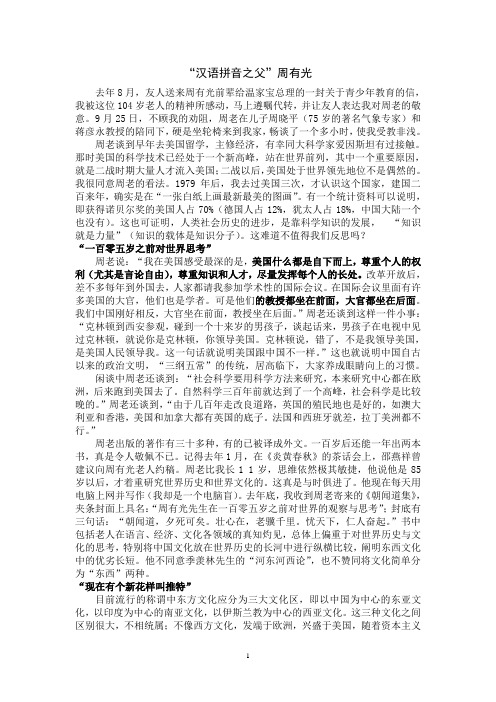
“汉语拼音之父”周有光去年8月,友人送来周有光前辈给温家宝总理的一封关于青少年教育的信,我被这位104岁老人的精神所感动,马上遵嘱代转,并让友人表达我对周老的敬意。
9月25日,不顾我的劝阻,周老在儿子周晓平(75岁的著名气象专家)和蒋彦永教授的陪同下,硬是坐轮椅来到我家,畅谈了一个多小时,使我受教非浅。
周老谈到早年去美国留学,主修经济,有幸同大科学家爱因斯坦有过接触。
那时美国的科学技术已经处于一个新高峰,站在世界前列,其中一个重要原因,就是二战时期大量人才流入美国;二战以后,美国处于世界领先地位不是偶然的。
我很同意周老的看法。
1979年后,我去过美国三次,才认识这个国家,建国二百来年,确实是在“一张白纸上画最新最美的图画”。
有一个统计资料可以说明,即获得诺贝尔奖的美国人占70%(德国人占12%,犹太人占18%,中国大陆一个也没有)。
这也可证明,人类社会历史的进步,是靠科学知识的发展,“知识就是力量”(知识的载体是知识分子)。
这难道不值得我们反思吗?“一百零五岁之前对世界思考”周老说:“我在美国感受最深的是,美国什么都是自下而上,尊重个人的权利(尤其是言论自由),尊重知识和人才,尽量发挥每个人的长处。
改革开放后,差不多每年到外国去,人家都请我参加学术性的国际会议。
在国际会议里面有许多美国的大官,他们也是学者。
可是他们的教授都坐在前面,大官都坐在后面。
我们中国刚好相反,大官坐在前面,教授坐在后面。
”周老还谈到这样一件小事:“克林顿到西安参观,碰到一个十来岁的男孩子,谈起话来,男孩子在电视中见过克林顿,就说你是克林顿,你领导美国。
克林顿说,错了,不是我领导美国,是美国人民领导我。
这一句话就说明美国跟中国不一样。
”这也就说明中国自古以来的政治文明,“三纲五常”的传统,居高临下,大家养成眼睛向上的习惯。
闲谈中周老还谈到:“社会科学要用科学方法来研究,本来研究中心都在欧洲,后来跑到美国去了。
自然科学三百年前就达到了一个高峰,社会科学是比较晚的。
“拼音之父”周有光:百岁星辰 文华灿然
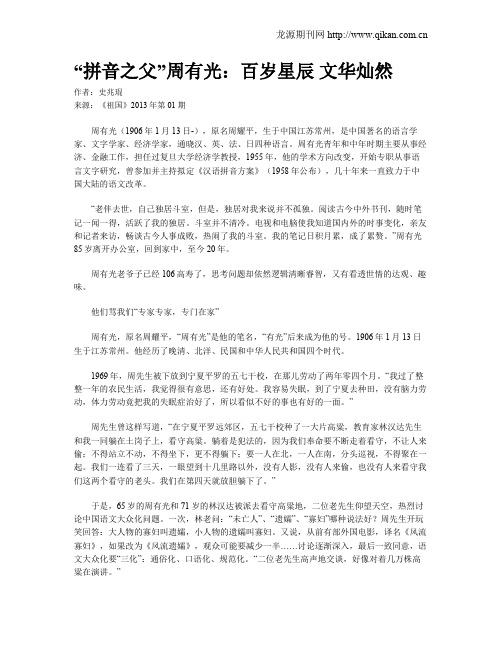
“拼音之父”周有光:百岁星辰文华灿然作者:史兆琨来源:《祖国》2013年第01期周有光(1906年1月13日-),原名周耀平,生于中国江苏常州,是中国著名的语言学家、文字学家、经济学家,通晓汉、英、法、日四种语言。
周有光青年和中年时期主要从事经济、金融工作,担任过复旦大学经济学教授,1955年,他的学术方向改变,开始专职从事语言文字研究,曾参加并主持拟定《汉语拼音方案》(1958年公布),几十年来一直致力于中国大陆的语文改革。
“老伴去世,自己独居斗室,但是,独居对我来说并不孤独。
阅读古今中外书刊,随时笔记一闻一得,活跃了我的独居。
斗室并不清冷。
电视和电脑使我知道国内外的时事变化,亲友和记者来访,畅谈古今人事成败,热闹了我的斗室。
我的笔记日积月累,成了累赘。
”周有光85岁离开办公室,回到家中,至今20年。
周有光老爷子已经106高寿了,思考问题却依然逻辑清晰睿智,又有看透世情的达观、趣味。
他们骂我们“专家专家,专门在家”周有光,原名周耀平,“周有光”是他的笔名,“有光”后来成为他的号。
1906年1月13日生于江苏常州。
他经历了晚清、北洋、民国和中华人民共和国四个时代。
1969年,周先生被下放到宁夏平罗的五七干校,在那儿劳动了两年零四个月。
“我过了整整一年的农民生活,我觉得很有意思,还有好处。
我容易失眠,到了宁夏去种田,没有脑力劳动,体力劳动竟把我的失眠症治好了,所以看似不好的事也有好的一面。
”周先生曾这样写道,“在宁夏平罗远郊区,五七干校种了一大片高粱,教育家林汉达先生和我一同躺在土岗子上,看守高粱。
躺着是犯法的,因为我们奉命要不断走着看守,不让人来偷;不得站立不动,不得坐下,更不得躺下;要一人在北,一人在南,分头巡视,不得聚在一起。
我们一连看了三天,一眼望到十几里路以外,没有人影,没有人来偷,也没有人来看守我们这两个看守的老头。
我们在第四天就放胆躺下了。
”于是,65岁的周有光和71岁的林汉达被派去看守高粱地,二位老先生仰望天空,热烈讨论中国语文大众化问题。
胸襟宽大度百年——“汉语拼音之父”周有光的不老人生

保健医苑3年第期保健医苑名人访谈|周老认为:做人就要胸襟宽大。
他说:“许多人问我,你的长寿之道是什么,我也想不出是什么道理,可我相信,做人不要生气是主要的。
德国哲学家尼采说得好‘生气是用别人的错误来惩罚自己’,这很有道理。
在世界上,许多事情不可能样样都顺利,吃亏就吃亏一点,没有什么了不起的。
”周老的话并非说说而已。
1956年,周老从上海调往北京,住在一所小洋房里,那是民国初期一位德国专家住的。
说是小洋房,但极为狭小,且年久失修,透风漏雨。
但周老却十分“汉语拼音之父”周有光的不老人生◎文/王明洪出生于1906年1月的原中国语言协会理事、北京语言协会顾问、中国语言文字学家、汉语拼音的创立者周有光今年已是107岁的高龄,但依然精神矍铄。
几十年来,周老一直致力于中国的语文改革。
百岁过后仍笔耕不辍,出版有《语言文字学的新探索》(2006年)、《周有光百岁口述》(2008年)、《朝闻道集》(2010年)等书,以至被人称为“汉语拼音之父”。
是什么原因使得周老的精力如此旺盛?这和他胸襟宽大、精神乐观、坚持运动等有着直接的关系。
和蔼可亲的周有光82012保健医苑名人访谈|豁达,他曾为这所“洋房”作《新陋室铭》:“山不在高,只要有葱郁的树林。
水不在深,只要有洄游的鱼群。
这是陋室,只要我唯物主义地快乐自寻。
房间阴暗,更显得窗子明亮。
书桌不平,更怪我伏案太勤。
门槛破烂,偏多不速之客。
地板跳舞,欢迎老友来临。
卧室就是厨房,饮食方便。
书橱兼作菜橱,菜有书香……”周老的“陋室铭”幽默而且乐观,显示出他对人生的大彻大悟和对红尘的笑眼旁观。
周老博学,谈锋甚健,且出语幽默诙谐。
一次,周老去医院看病,医生知道他是个寿星,就问他的养生之道是什么,可周老回答:“你是医生,怎么问我呢?”一句话,把医生问得张口结舌,半天回答不上来。
周老曾自称他有“多语症”,殊不知语多必失。
“文革”时,单位有人戏出上联:“伊凡彼得斯大林”,周老信口回答:“秦皇汉武毛泽东”。
《汉语拼音之父周有光》阅读理解及答案
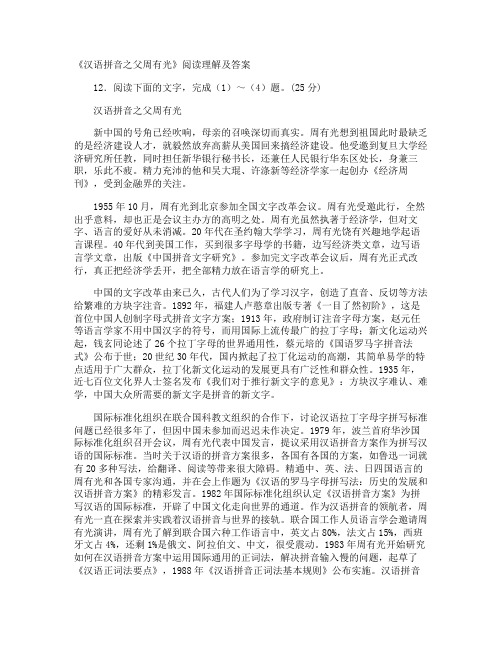
《汉语拼音之父周有光》阅读理解及答案12.阅读下面的文字,完成(1)~(4)题。
(25分)汉语拼音之父周有光新中国的号角已经吹响,母亲的召唤深切而真实。
周有光想到祖国此时最缺乏的是经济建设人才,就毅然放弃高薪从美国回来搞经济建设。
他受邀到复旦大学经济研究所任教,同时担任新华银行秘书长,还兼任人民银行华东区处长,身兼三职,乐此不疲。
精力充沛的他和吴大琨、许涤新等经济学家一起创办《经济周刊》,受到金融界的关注。
1955年10月,周有光到北京参加全国文字改革会议。
周有光受邀此行,全然出乎意料,却也正是会议主办方的高明之处。
周有光虽然执著于经济学,但对文字、语言的爱好从未消减。
20年代在圣约翰大学学习,周有光饶有兴趣地学起语言课程。
40年代到美国工作,买到很多字母学的书籍,边写经济类文章,边写语言学文章,出版《中国拼音文字研究》。
参加完文字改革会议后,周有光正式改行,真正把经济学丢开,把全部精力放在语言学的研究上。
中国的文字改革由来已久,古代人们为了学习汉字,创造了直音、反切等方法给繁难的方块字注音。
1892年,福建人卢憨章出版专著《一目了然初阶》,这是首位中国人创制字母式拼音文字方案;1913年,政府制订注音字母方案,赵元任等语言学家不用中国汉字的符号,而用国际上流传最广的拉丁字母;新文化运动兴起,钱玄同论述了26个拉丁字母的世界通用性,蔡元培的《国语罗马字拼音法式》公布于世;20世纪30年代,国内掀起了拉丁化运动的高潮,其简单易学的特点适用于广大群众,拉丁化新文化运动的发展更具有广泛性和群众性。
1935年,近七百位文化界人士签名发布《我们对于推行新文字的意见》:方块汉字难认、难学,中国大众所需要的新文字是拼音的新文字。
国际标准化组织在联合国科教文组织的合作下,讨论汉语拉丁字母字拼写标准问题已经很多年了,但因中国未参加而迟迟未作决定。
1979年,波兰首府华沙国际标准化组织召开会议,周有光代表中国发言,提议采用汉语拼音方案作为拼写汉语的国际标准。
“汉语拼音之父”周有光——有光一生,一生有光

周有光先生是一位保持心灵睿智最为长久的学者,每年有更多的报道在他生日前后出现,就像一种习惯性反应,多半匆匆一掠,难以深入。
因为他是“名人”,有很多光环,而且如此长寿,自然会吸引媒体和大众的关注。
唯有非常理性的人,才能体会到这种异于常人之长寿,或如寂寞花开的过程。
“汉语拼音之父”周有光——有光一生,一生有光2017年1月14日,我国著名语言学家、“汉语拼音之父”周有光去世,享年112岁。
周有光身上的标签实在太多:作家沈从文的连襟、才女张允和的丈夫、经济学家、语言学家。
周有光一辈子活出了别人几辈子。
他的一生分了几个阶段:50岁以前是银行家;50岁到85岁,是语言文字学家,精力都倾注在语言文学领域;85岁开始写文章,广泛探讨诸如全球化、中东局势、公民意识等问题,成为公共知识分子。
C ulture 文化·阅读本栏目冠名:英皇星艺(北京)文化发展有限公司. All Rights Reserved.有救国抱负,但保持政治上的疏离感资中筠先生说,周有光先生在民国时代受到了最好的教育,为他的人生打下了最好的底色。
很早他就与那个时代的许多青年学生一样,受到五四运动中科学和民主思潮的熏染。
周有光先生自己说,17岁他从常州中学毕业,阅读英文已无障碍。
而考上圣约翰大学,无疑是他最珍视的经历,他因此从一个江南小城市来到风云际会的上海,眼界由此大为开阔。
抗战时期,是周有光先生精神极为振奋,投入精力最多的几年。
1937年周有光先生带着全家离开上海,经过长沙、成都,最后到达重庆。
这一时期,他主要为南京国民政府设立的农本局工作,“因为跟日本人打仗,要有后方经济的支持”。
抗战前夕,鉴于“复兴农村工作”和“加强农业金融发展”的需要而设立的农本局,在以重庆为大本营的抗战后方起到了流通农村资金、调整农产运销、支撑后方经济的巨大作用。
按照周有光先生的描述,就是要尽快解决从东南沿海转移到重庆几十万人的吃穿问题。
1949年以前,周有光主要从事与经济相关的工作。
“汉语拼音之父”周有光,112岁的长寿仁者
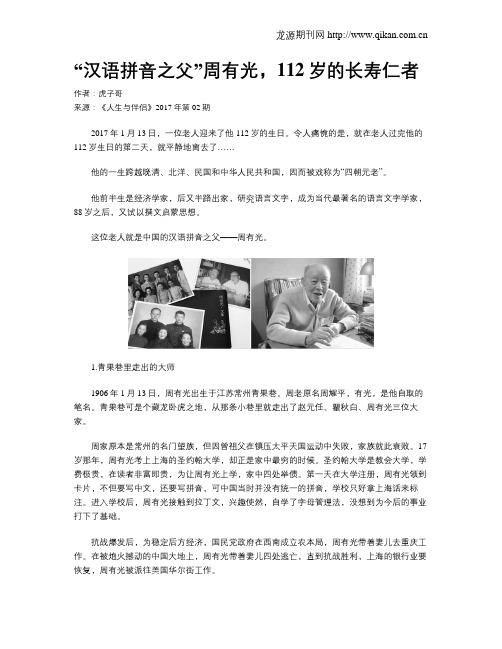
“汉语拼音之父”周有光,112岁的长寿仁者作者:虎子哥来源:《人生与伴侣》2017年第02期2017年1月13日,一位老人迎来了他112岁的生日。
令人痛惋的是,就在老人过完他的112岁生日的第二天,就平静地离去了……他的一生跨越晚清、北洋、民国和中华人民共和国,因而被戏称为“四朝元老”。
他前半生是经济学家,后又半路出家,研究语言文字,成为当代最著名的语言文字学家,88岁之后,又试以撰文启蒙思想。
这位老人就是中国的汉语拼音之父——周有光。
1.青果巷里走出的大师1906年1月13日,周有光出生于江苏常州青果巷。
周老原名周耀平,有光,是他自取的笔名。
青果巷可是个藏龙卧虎之地,从那条小巷里就走出了赵元任、瞿秋白、周有光三位大家。
周家原本是常州的名门望族,但因曾祖父在镇压太平天国运动中失败,家族就此衰败。
17岁那年,周有光考上上海的圣约翰大学,却正是家中最穷的时候。
圣约翰大学是教会大学,学费极贵,在读者非富即贵,为让周有光上学,家中四处举债。
第一天在大学注册,周有光领到卡片,不但要写中文,还要写拼音,可中国当时并没有统一的拼音,学校只好拿上海话来标注。
进入学校后,周有光接触到拉丁文,兴趣使然,自学了字母管理法,没想到为今后的事业打下了基础。
抗战爆发后,为稳定后方经济,国民党政府在西南成立农本局,周有光带着妻儿去重庆工作。
在被炮火撼动的中国大地上,周有光带着妻儿四处逃亡,直到抗战胜利,上海的银行业要恢复,周有光被派往美国华尔街工作。
当时,他有个叫何廉的朋友,一日寻上门来对他说:“爱因斯坦现在没事做,想找个人陪他聊天,你要不要去?”周有光一听,当然要去!于是穿得精神抖擞上门拜访,却没想到爱因斯坦穿得极为随便,见了他就像对待老朋友一样。
谈话间,爱因斯坦对他说:“人的差别在业余,一个人到60岁,除去吃饭、睡觉、工作,还有很多业余的时间,如果能够好好利用这些时间,完全可以在一门学科上有所建树。
”一番话将周有光点醒,此后,他开始钻研语言学,发誓不让自己的每一天虚度。
被上帝遗忘了的"汉语拼音之父"
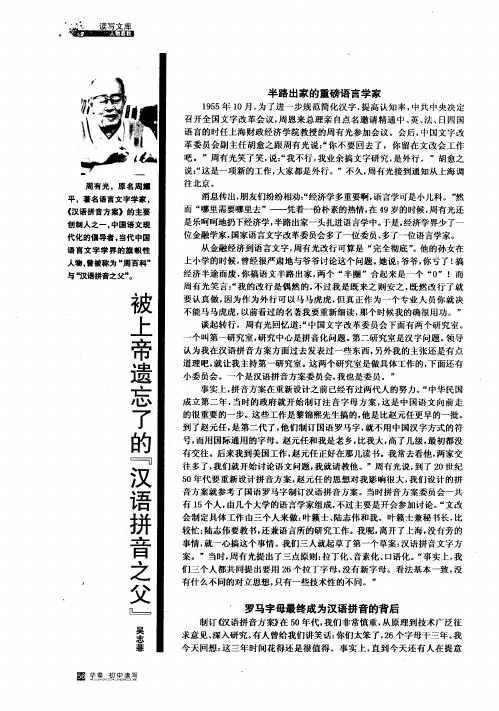
半路 出家 的重磅语 言学 家
15 9 5年 1 , 了进 一 步 规 范 简 化 汉 字 , 高 认 知 率 , 0月 为 提 中共 中央 决定 召 开 全 国 文字 改革 会 议 , 恩 来 总 理 亲 自点 名 邀 请 精 通 中 、 、 、 四 国 周 英 法 日 语言 的时任上海财政经济学 院教授的周有光参加会议 。会后 , 中国文字改 革 委 员会 副主 任 胡 愈之 跟 周 有 光 说 : 你 不 要 回 去 了 ,你 留 在 文 改 会 工 作 “
一
个叫第一研究室, 研究中心 是拼音化问题 。 第二研究室是汉字问题 。 领导
认 为 我 在 汉 语拼 音方 案 方 面 过 去 发 表 过 一些 东西 , 外我 的主 张 还 是 有 点 另
遗
1=:
,
道理吧, 就让我主持第一研 究室 。 这两个研究室是做具体工作的, 下面还有
小 委 员会 。一 个 是汉 语 拼 音 方 案委 员 会 , 也 是 委 员 。 ” 我 事 实上 , 音 方 案 在 重新 设 计 之前 已经 有 过 两代 人 的 努 力 。 中华 民国 拼 “ 成 立 第 二 年 , 时 的政 府就 开始 制订 注 音 字 母 方 案 , 是 中 国语 文 向 前 走 当 这 的 很 重要 的 一 步 。这 些 工作 是 黎 锦 熙 先生 搞 的 , 是 比赵 元 任 更 早 的 一批 。 他 到 了赵 元任 , 第 二代 了 , 们 制 订 国语 罗马 字 , 是 他 就不 用 中 国汉 字 方 式 的 符 号 , 用 国 际通 用 的 字母 。 元任 和 我 是 老 乡 , 而 赵 比我 大 , 了几 级 , 初 都 没 高 最
语文写作——人物素材大整理之周有光

语文写作——人物素材大整理之周有光2019年4月5日人物素材之周有光【素材回放】刚过完112岁生日,我国着名语言学家、“汉语拼音之父”周有光先生于1月14日凌晨去世。
1906年1月13日出生于江苏,原名周耀平。
早年研读经济学,1955年开始,专职从事语言文字研究,是汉语拼音方案的主要制订者,并主持制订了《汉语拼音正词法基本规则》,因此被称为“汉语拼音之父”。
不过周有光并不认可这个头衔,他曾表示,“读过我书的人,决不会把那顶桂冠随便加在我头顶上”。
85%的中国人是文盲。
包括汉字简化和拼音化等在内的文字改革,加上一系列教育政策的出台,使如今的中国成为全世界会读写人口最多的国家。
历经了晚清、民国,新中国,周有光见证了百年风云的变化。
他厚重的人生,也堪称传奇。
他娶了“张家四姐妹”中的张允和,与沈从文是连襟。
由于博闻强识,他是沈从文眼中的“周百科”;他曾和爱因斯坦聊天下大事,就如同“拉家常”;他还和溥仪做过“饭友”,天天同桌吃饭;50岁,他毅然从经济转为文字研究,并坦然“哪里需要就去哪里”;百岁之后,仍然着书立说笔耕不辍……上帝没有忘了他。
世人也不会忘了他。
他的一生充满传奇,可以说是中国百年来风云变幻、历史变迁的一位见证者,见证了中国百年来从疲弱到富强的整个过程。
他的去世,是一个遗憾,我们又少了一位睿智而又功勋卓着的前辈学者。
高寿本已经难得,能够在百岁高龄,仍旧保持着敏锐的观察力,并发出极富智慧的见解,非常值得尊重。
确实,很多人都做出过贡献,但周有光的贡献也绝不可忽视。
尤其是他在推动中国与世界融合方面,功不可没。
这位出生于清末的百岁老人,历经世纪沧桑,近些年反复提倡要有世界观,扩大世界观,强调不能以中国的眼光看世界,而要“以世界的眼光看中国”。
“周百科”外号的来历周有光“周百科”的外号,为连襟沈从文所赐。
其实大学时,周有光与百科全书的情缘就结下了。
当时,大学老师指定《不列颠百科全书》的一些篇章作为周有光及其同学必须阅读的课外读物。
语文小报 之 名人故事(二)
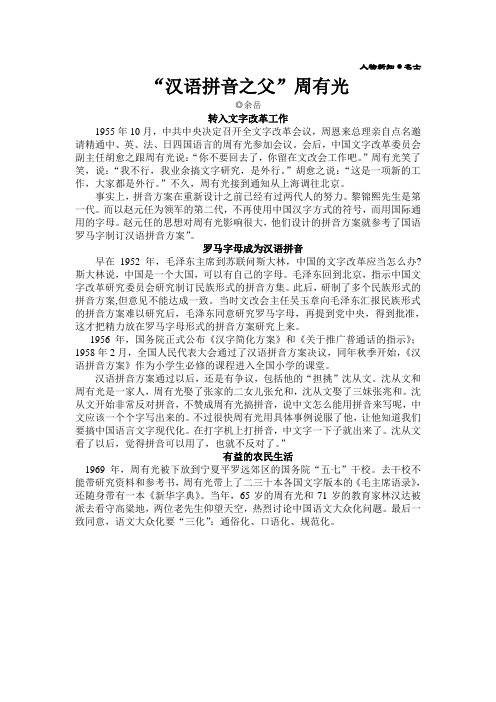
人物新知·名士“汉语拼音之父”周有光◎余岳转入文字改革工作1955年10月,中共中央决定召开全文字改革会议,周恩来总理亲自点名邀请精通中、英、法、日四国语言的周有光参加会议。
会后,中国文字改革委员会副主任胡愈之跟周有光说:“你不要回去了,你留在文改会工作吧。
”周有光笑了笑,说:“我不行,我业余搞文字研究,是外行。
”胡愈之说:“这是一项新的工作,大家都是外行。
”不久,周有光接到通知从上海调往北京。
事实上,拼音方案在重新设计之前已经有过两代人的努力。
黎锦熙先生是第一代。
而以赵元任为领军的第二代,不再使用中国汉字方式的符号,而用国际通用的字母。
赵元任的思想对周有光影响很大,他们设计的拼音方案就参考了国语罗马字制订汉语拼音方案”。
罗马字母成为汉语拼音早在1952年,毛泽东主席到苏联问斯大林,中国的文字改革应当怎么办?斯大林说,中国是一个大国,可以有自己的字母。
毛泽东回到北京,指示中国文字改革研究委员会研究制订民族形式的拼音方集。
此后,研制了多个民族形式的拼音方案,但意见不能达成一致。
当时文改会主任吴玉章向毛泽东汇报民族形式的拼音方案难以研究后,毛洚东同意研究罗马字母,再提到党中央,得到批准,这才把精力放在罗马字母形式的拼音方案研究上来。
1956年,国务院正式公布《汉字简化方案》和《关于推广普通话的指示》;1958年2月,全国人民代表大会通过了汉语拼音方案决议,同年秋季开始,《汉语拼音方案》作为小学生必修的课程进入全国小学的课堂。
汉语拼音方案通过以后,还是有争议,包括他的“担挑”沈从文。
沈从文和周有光是一家人,周有光娶了张家的二女儿张允和,沈从文娶了三妹张兆和。
沈从文开始非常反对拼音,不赞成周有光搞拼音,说中文怎么能用拼音来写呢,中文应该一个个字写出来的。
不过很快周有光用具体事例说服了他,让他知道我们要搞中国语言文字现代化。
在打字机上打拼音,中文字一下子就出来了。
沈从文看了以后,觉得拼音可以用了,也就不反对了。
- 1、下载文档前请自行甄别文档内容的完整性,平台不提供额外的编辑、内容补充、找答案等附加服务。
- 2、"仅部分预览"的文档,不可在线预览部分如存在完整性等问题,可反馈申请退款(可完整预览的文档不适用该条件!)。
- 3、如文档侵犯您的权益,请联系客服反馈,我们会尽快为您处理(人工客服工作时间:9:00-18:30)。
汉语拼音之父:周有光作者:来源:《时代英语·高一》2014年第01期周有光,如果不是研究汉语或是对汉语感兴趣的人,或许对这个名字很陌生。
殊不知,这位今年108岁高寿的学者就是我们每天工作学习都离不开的汉语拼音的创始人之一。
现在,就让我们一起走进周老先生的世界吧。
Even at 108 years old, Zhou Youguang is the kind of creative thinker that Chinese leaders regularly comma nd the government to cultivate in their bid to raise their nation from the world‟s factory floor.Mr Zhou is the inventor of Pinyin,the Romanized spelling system that linked China‟s ancient written language to the modern age and helped China all but stamp out illiteracy. He was one of the leaders of the Chinese translation of the Encyclopedia Britannica in the 1980s. He has written about 40 books, the most recent published in 2011.Chinese characters do not directly correspond to sounds. Pi nyin‟s phonetic alphabet enabled learners to match words easily to actual speech.“It had an enormous impact on literacy,” said Victor H. Mair, a professor of Chinese language and literature at the University of Pennsylvania. All Chinese students now begin to read and write using Pinyin before moving on to characters.Sweet-natured but wry and rigidly dispassionate, Mr Zhou works at a tiny wooden desk in a government-provided, third-floor walk-up apartment with unpainted concrete walls. His longtime colleague Chen Zhangtai, 82, said Mr Zhou thought renovations would be too distracting.He described Mr Zhou as the embodiment of a “true scholar.” He added,“His blog entries range from the modernization of Confucianism to Silk Road histo ry and China‟s new middle class. Computer screens hurt his eyes, but he devours foreign newspapers and magazines. A well-known Chinese artist nicknamed him …Trendy Old Guy‟ ”.Mr Zhou was born on Jan. 13, 1906, when the Qing Dynasty ruled and women bound their feet. The son of a Qing Dynasty official, he married the daughter of a wealthy family and went into banking.After the Japanese invaded in 1937, his family was forced into the countryside to escape Japanese bombs in Chongqing,China‟s wartime capital. His 5-year-old daughter died from appendicitis.In 1946, Mr Zhou and his family moved to New York, where he represented the Xinhua Trust and Savings Bank. He toured the United States in luxury Pullman cars, rode the Queen Elizabeth ocean liner to Europe and fended off offers from Western banks. His intellectual life was equally rich: he had several lengthy chats with Albert Einstein.In 1949, Mr Zhou brought his family home. He taught economics at a university in Shanghai and studied linguistics as a hobby.In 1955, Zhou Enlai, prime minister, called him to Beijing. The party wanted to make Mandarin China‟s national language, simplify Chinese characters and devise a new phonetic alphabet.Mr Zhou‟s son, Zhou Xiaoping, an astrophysicist, said his father protested that he was a mere amateur. He was told:“Everyone is an amateur.”In his new job, Mr Zhou found tremendous confusion, but also a foundation for his work. In the late 1500s, the Italian Jesuit Matteo Ricci had formulated a system to Romanize Chinese characters. Many English speakers were already using the British Wade-Giles system developed in the 19th century. Chinese linguists had devised other alternatives.Mr Zhou argued for the Roman alphabet, to better connect China with the outside world. In 1958, after three years of work, Pinyin—literally “to piece together sounds”—was finished and quickly adopted.Mr Zhou says Chinese characters will exist for centuries to come. But to his delight, Pinyin has proven ever more useful. Chinese now rely on Pinyin-to-character programs to input chinese characters, text messages, post on Internet microblogs and write e-mails.尽管已经108岁高龄,周有光老先生仍然是一位极富创见的思想家。
我国领导人时不时地都会要求政府工作人员去聆听他的意见,以提高中国在世界工厂中的地位。
周老先生发明了拼音,用拉丁字母来拼写古老的中国汉字,让我国文字现代化,这几乎帮助我国消灭了文盲。
20世纪80年代,他曾主持翻译中文版的《不列颠百科全书》。
他有40余本著作,最近一本是2011年出版的。
汉字本身并不直接表示发音。
拼音的音标字母使学习者能够轻而易举地将文字与发音匹配在一起。
“它对读写识字产生了重要的影响。
”宾夕法尼亚大学中国语言与文学教授Victor H. Mair这样说,“现在所有的中国学生在学习汉字以前都先学习使用拼音读写。
”周老天性温和,严厉公正又不失诙谐。
他住在一处政府提供的三层楼高的公寓里,他有一个木制办公桌,水泥墙面并没有粉刷。
他的老同事,82岁的陈章太说:“周老觉得装修实在是太麻烦了。
”陈章太认为周老是真正的学者。
他说:“他只不过看上去似乎与这个世界和平相处。
”他还是为这个世界着迷。
他的博客谈古论今,从儒学现代化到丝绸之路的历史,再到中国新中产阶级。
电脑屏幕对他的眼睛不好,他就花时间去看外国的报纸杂志。
一位家喻户晓的中国艺术家给他取了个绰号叫…新潮老头。
‟”周老生于1906年1月13日,那是清朝末年妇女还裹小脚的时代。
他的父亲是一位清朝官员。
后来周老娶了一位有钱人家的小姐,进了银行业。
1937年,日本入侵以后,他全家被迫逃亡乡下,躲避日军在战时首都重庆的炮火。
他5岁的女儿死于阑尾炎。
1946年,周老一家迁居纽约,当时他是新华信托储蓄银行的代表。
他搭乘奢华的普尔曼卧铺车环游美利坚,乘坐伊丽莎白女王号远洋邮轮奔赴欧洲,还拒绝了西方一些银行的工作机会。
他的学术生活也同样丰富,他曾多次与爱因斯坦长谈。
1949年,周老带着家人返回中国。
他在上海的一所大学教经济学,并出于爱好而研究语言学。
